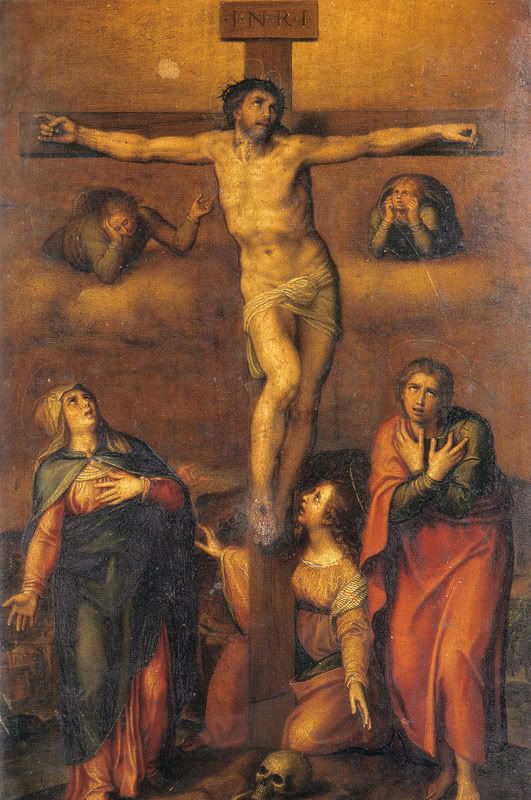Saturday, September 12, 2009
My Ten Thousandth Blog Entry
No, really. This is number 10,000. At one point, this blog was to me like Twitter is to some people now: a living record of life, thought. Now I don't blog nearly as much as I used to, and I pretty much keep on topic.
Oh well. Ten thousand. I suppose that is a milestone of sorts. Ten thousand posts in more than 7 years.
Oh well. Ten thousand. I suppose that is a milestone of sorts. Ten thousand posts in more than 7 years.
Labels: Recta Ratio Housekeeping
Our Blessed Lady's Saturday

Mary, most holy Virgin and Queen of Martyrs, accept the sincere homage of my filial affection. Into thy Heart, pierced by so many swords, do thou welcome my poor soul. Receive it as the companion of thy sorrows at the foot of the Cross, on which Jesus died for the redemption of the world. With thee, O sorrowful Virgin, I will gladly suffer all the trials, contradictions, and infirmities which it shall please Our Lord to send me. I offer them all to thee in memory of thy sorrows, so that: every thought of my mind and every beat of my heart may be an act of compassion and of love for thee. And do thou, sweet Mother, have pity on me, reconcile me to thy Divine Son, Jesus; keep me in His grace and assist me in my last agony, so that I may be able to meet thee in Heaven and sing thy glories.
Most holy Virgin and Mother, whose soul was pierced by a sword of sorrow in the Passion of thy Divine Son, and who in His glorious Resurrection wast filled with never ending joy at His triumph, obtain for us who call upon thee, so to be partakers in the adversities of Holy Church and the Sorrows of the Sovereign Pontiff, as to be found worthy to rejoice with them in the consolations for which we pray, in the charity and peace of the same Christ our Lord. Amen.
Labels: Our Blessed Lady
Friday, September 11, 2009
Friday At the Foot Of the Cross

O my good Jesus, my dear Savior, I compassionate Thee in Thy sufferings. I fervently bless Thee and thank Thee for all Thou hast done and suffered for me; give me grace to weep over the sins and the ingratitude which caused Thy dreadful agony. Sweet Jesus, mercy! Pardon me, O Lord, for my past indifference to Thy love.
Heart of Jesus, burning with love for us, set our hearts on fire with love of Thee.
May those bonds which confined Thy hands burst the fetters of my sins, and restore me to the sweet liberty of Thy children! I cast myself at Thy sacred feet, O my King and my God; and since Thou hast undergone the humiliation of allowing Thyself to be bound by Thy creatures, may I place my happiness in sharing Thy humiliations, and carrying Thy Cross.
Amen.
Labels: Friday At the Foot Of the Cross
Eight Years Later, The War Continues
The war against Islamo-fascist terrorism that began on September 11, 2001 continues on battlefields around the world.
We fight still in Afghanistan and Iraq openly with our armed forces. We fight everywhere else a clandestine war against those who have supported or do support our enemies in any way. We fight in every nation, including, especially, our own. We fight with bombs and missiles, infantry and tanks. We fight with reconnaissance drones and satellites. We fight with surveillance and wiretapping. We fight with infiltration and disinformation. We fight by aiding political forces favorable to us, and trying to nobble those against us. We fight with radio broadcasts, book publishing, and on the internet. We fight with money to good causes. We fight with cutting off funding to the enemy from the malinformed or ill-meaning.
We fight with persuasion. And where that doesn't work, we fight with a knife across the throat in a dark alley or with the cars of those who aid our enemy suddenly exploding. We fight everywhere and at all times. We fight in defense of the West, of Christendom, of the US, of capitalism, and of political liberality.
We do not weaken. We do not cut and run. We do not back down. We stay, and we fight. We have no other choice.
The war is not separable into distinct "wars" each requiring their own justification. It is all of a piece. The "war" in Iraq is as much a campaign in this larger war as the Campaign in Italy was part of World War II. Afghanistan is as much a campaign in this larger war as the Pacific Islands were a campaign of World War II.
There is much still to do. While Islamo-fascist violence in Iraq has diminished, it is not yet quelled. Afghanistan remains a problem. So too, does Iran, and Syria, and Libya. And then there are the power vacuums in Yemen and Pakistan, where government has with one hand helped the cause of order, and with the other aided the enemy quietly. The war won't be over until there are no wealthy benefactors ready to give to the enemy, until there is no government on earth supporting it in any way, until no one dares to bear arms in the Islamo-fascist cause.
Fortunately, we are not on entirely new ground here. Wars like this one have been fought and won before. Britain against Revolutionary and Napoleonic France. The US and the West against Soviet Communism. We have the examples before us, and only need to apply their lessons correctly.
It is not a glamorous war. There is little glory to be gained. But if we do not hang on and see the war through to its conclusion, no matter how many decades away that might be, we would not want to bequeath the world that would result to posterity. We are not the world's policeman. Instead, we are the world's garbage collectors. It is an appalling job. But if it isn't done (and no one else will do it) the filth will simply overwhelm us.
This is what happens when no one has taken out the trash for a long time:






We pray for the poor souls murdered by the Islamo-fascist terrorists on September 11, 2001. We pause a moment and weep for those taken from their ordinary lives by air pirates and their supporters. We remember what the murderous bastards did to us on that day. We harden our hearts and gird our loins for the fight that remains.
And we do not fool ourselves into thinking the war is won, and that it is time to withdraw and tend to our domestic problems. We do not blow the trumpet that signals retreat. We may have elected particularly obtuse leaders last November, people who view national security policy the way fish view bicycles. But the American people know that is a war still to be waged and battles to be fought.
God bless our armed forces and God bless the USA!!!
We fight still in Afghanistan and Iraq openly with our armed forces. We fight everywhere else a clandestine war against those who have supported or do support our enemies in any way. We fight in every nation, including, especially, our own. We fight with bombs and missiles, infantry and tanks. We fight with reconnaissance drones and satellites. We fight with surveillance and wiretapping. We fight with infiltration and disinformation. We fight by aiding political forces favorable to us, and trying to nobble those against us. We fight with radio broadcasts, book publishing, and on the internet. We fight with money to good causes. We fight with cutting off funding to the enemy from the malinformed or ill-meaning.
We fight with persuasion. And where that doesn't work, we fight with a knife across the throat in a dark alley or with the cars of those who aid our enemy suddenly exploding. We fight everywhere and at all times. We fight in defense of the West, of Christendom, of the US, of capitalism, and of political liberality.
We do not weaken. We do not cut and run. We do not back down. We stay, and we fight. We have no other choice.
The war is not separable into distinct "wars" each requiring their own justification. It is all of a piece. The "war" in Iraq is as much a campaign in this larger war as the Campaign in Italy was part of World War II. Afghanistan is as much a campaign in this larger war as the Pacific Islands were a campaign of World War II.
There is much still to do. While Islamo-fascist violence in Iraq has diminished, it is not yet quelled. Afghanistan remains a problem. So too, does Iran, and Syria, and Libya. And then there are the power vacuums in Yemen and Pakistan, where government has with one hand helped the cause of order, and with the other aided the enemy quietly. The war won't be over until there are no wealthy benefactors ready to give to the enemy, until there is no government on earth supporting it in any way, until no one dares to bear arms in the Islamo-fascist cause.
Fortunately, we are not on entirely new ground here. Wars like this one have been fought and won before. Britain against Revolutionary and Napoleonic France. The US and the West against Soviet Communism. We have the examples before us, and only need to apply their lessons correctly.
It is not a glamorous war. There is little glory to be gained. But if we do not hang on and see the war through to its conclusion, no matter how many decades away that might be, we would not want to bequeath the world that would result to posterity. We are not the world's policeman. Instead, we are the world's garbage collectors. It is an appalling job. But if it isn't done (and no one else will do it) the filth will simply overwhelm us.
This is what happens when no one has taken out the trash for a long time:






We pray for the poor souls murdered by the Islamo-fascist terrorists on September 11, 2001. We pause a moment and weep for those taken from their ordinary lives by air pirates and their supporters. We remember what the murderous bastards did to us on that day. We harden our hearts and gird our loins for the fight that remains.
And we do not fool ourselves into thinking the war is won, and that it is time to withdraw and tend to our domestic problems. We do not blow the trumpet that signals retreat. We may have elected particularly obtuse leaders last November, people who view national security policy the way fish view bicycles. But the American people know that is a war still to be waged and battles to be fought.
God bless our armed forces and God bless the USA!!!
Labels: American Patriotism Is Not A Sin, er
Thursday, September 10, 2009
Message From the Holy Souls: Pray For Us
Sometimes, subtle but important messages are delivered through unlikely sources. This morning, when I was going into church for my holy hour (and my Thursday holy hour is the shortest of the week, coming in at just an hour instead of the usual 1.5-2 hours because of an early Thursday schedule). I had just dipped my hand into the holy water fount and blessed myself, when an elderly chap on a Lark came over and said, "Remember, when you bless yourself to pray for the Holy Souls." It was sort of unusual, because I don't think I've said more than 10 words to the guy in 3 years. But I indicated that I thought that was a good idea, and left the narthex to head for my usual place near the Tabernacle.
First order of business once I got settled and set my crucifix up on the top of the back of the pew in front of me, since this was my short holy hour and I have to omit the Rosary and Divine Mercy Chaplet because of time considerations, was to open my 1959 Saint Joseph Daily Missal to the readings for the Extraordinary Form for the day. Today is the feast of Saint Nicholas of Tolentino, and almost the only information contained about him was that he was particularly devoted to the Holy Souls.
So the Holy Souls were double-teaming me with prayer requests this morning. Why me? Maybe because I try to pay attention to little messages like that. Maybe because they know that this blog contains a lot of information on the Holy Souls and their needs every Hallowmas.
Why now? Six weeks from now, this blog usually goes all out for them anyway. Maybe because the Holy Souls in Purgatory are in desperate need for prayers, Masses, fasting, almsgiving, and Rosaries to alleviate their suffering and speed their purgation. Now and always, not just in the novena period before and octave after All Souls.
So allow me to anticipate my usual late-fall focus on the Holy Souls, and ask you now to pray for them. Offer prayers, Rosaries, Masses, fasts, almsgiving, and other good works for them. They are in need all the time, not just in late October and early November. Those poor souls are indeed suffering the very same torments as the damned suffer, namely purging fire, but with the difference that they know that someday, they will be released from their tortures, and will be among the Blessed in Heaven, where the damned are damned for all eternity, and there will never be an end to their torments.
Suffering purging fire is no pleasant thing. I once embraced the concept of Purgatory as waiting room, where souls waited patiently 10, 20, 50, or 100 years for "their turn." No real suffering, but lots of boredom. As someone who has spent an awful lot of his life waiting for this or that, I could understand that.
But my reading has convinced me that Purgatory is not just a giant waiting room. It is essentially the same as Hell. With all that Hell implies. So that explains the urgency one feels in requests for prayers for those Holy But Poor Souls there.
Who is there? The ranks of the souls in Purgatory could contain a huge percentage of people we ourselves have known who have died in the last hundred years. Parents, siblings, aunts, uncles, cousins, grandparents, neighbors, friends, classmates, teachers, professors, shopkeepers, writers, thinkers, singers, performers, actors, politicians, journalists, doctors, ball players.
Think of that. Your mom, your brother, your fourth grade teacher, your favorite professor, the guy who ran the convenience store you got a comic book at every Sunday, the old lady down the street who always baked cookies for you, or gave you an especially big bag of treats at Halloween, the guy who owned the gas station you always filled your first car up at, the journalist or pundit who changed your views about this or that, the politician you admired most, your pediatrician, your high school sweetheart, your favorite baseball player of your youth, or the singer who you liked best growing up could be suffering unspeakable torments now, even 50 years after they died.
And you are reluctant to offer Saint Gertrude's Prayer, said to release a thousand souls to Heaven every time it is said, to skip a meal and offer it for the Holy Souls, to give an extra $10 to the Poor Box at church, to offer your Rosary or the Mass you hear, for people who once were an integral part of your life?
Are we that ungrateful?
If we are, maybe self-interest will prompt us to greater charity.
If you are very lucky, and are not damned to Hell for all eternity yourself, you will be among the Suffering Souls in Purgatory. Let's face it. You are not holy enough to draw a "Go Directly To Heaven Card." Even the most pious old church lady you know is probably going to spend 50 years or more in Purgatory.
And when you are there, you will then be, as they are now, in desperate need of prayers, Masses, Rosaries, almsgiving, fasts, and good works. And you will be very grateful if someone on earth prays for your rapid salvation and purgation. Because once you are there, only the prayers of those on earth can speed your purgation and end your sufferings and get you to Heaven faster. The Holy Souls are called the Poor Souls because they can't do anything for themselves any more. Only the living can help them, and only those living after we die can help us through Purgatory with prayers.
So do everything to foster a renewal of the cult of praying for the Souls in Purgatory, because it works to your own self interest. It is like "pay\ing it forward."
With the decline in belief and practice, fewer people are praying for those souls today compared to 100 years ago. Even family members now think everything is hunky-dory with the dead, and they go straight to heaven, and are swiftly forgotten. Fewer people praying for the souls in Purgatory means they end up staying there longer. Suffering more and longer.
But if we pray for them they suffer for a shorter time, and see the face of God faster. And if we foster the practice of praying for the dead, we will benefit from those prayers of those who come after us.
Memento Mori and pray for the Holy Souls in Purgatory.
Prayer of Saint Gertrude For the Holy Souls
Eternal Father, I offer Thee the Most Precious Blood of Thy Divine Son, Jesus, in union with the Masses said throughout the world today, for all the holy souls in Purgatory, for sinners everywhere, for sinners in the universal Church, those in my own home, and within my family. Amen.

First order of business once I got settled and set my crucifix up on the top of the back of the pew in front of me, since this was my short holy hour and I have to omit the Rosary and Divine Mercy Chaplet because of time considerations, was to open my 1959 Saint Joseph Daily Missal to the readings for the Extraordinary Form for the day. Today is the feast of Saint Nicholas of Tolentino, and almost the only information contained about him was that he was particularly devoted to the Holy Souls.
So the Holy Souls were double-teaming me with prayer requests this morning. Why me? Maybe because I try to pay attention to little messages like that. Maybe because they know that this blog contains a lot of information on the Holy Souls and their needs every Hallowmas.
Why now? Six weeks from now, this blog usually goes all out for them anyway. Maybe because the Holy Souls in Purgatory are in desperate need for prayers, Masses, fasting, almsgiving, and Rosaries to alleviate their suffering and speed their purgation. Now and always, not just in the novena period before and octave after All Souls.
So allow me to anticipate my usual late-fall focus on the Holy Souls, and ask you now to pray for them. Offer prayers, Rosaries, Masses, fasts, almsgiving, and other good works for them. They are in need all the time, not just in late October and early November. Those poor souls are indeed suffering the very same torments as the damned suffer, namely purging fire, but with the difference that they know that someday, they will be released from their tortures, and will be among the Blessed in Heaven, where the damned are damned for all eternity, and there will never be an end to their torments.
Suffering purging fire is no pleasant thing. I once embraced the concept of Purgatory as waiting room, where souls waited patiently 10, 20, 50, or 100 years for "their turn." No real suffering, but lots of boredom. As someone who has spent an awful lot of his life waiting for this or that, I could understand that.
But my reading has convinced me that Purgatory is not just a giant waiting room. It is essentially the same as Hell. With all that Hell implies. So that explains the urgency one feels in requests for prayers for those Holy But Poor Souls there.
Who is there? The ranks of the souls in Purgatory could contain a huge percentage of people we ourselves have known who have died in the last hundred years. Parents, siblings, aunts, uncles, cousins, grandparents, neighbors, friends, classmates, teachers, professors, shopkeepers, writers, thinkers, singers, performers, actors, politicians, journalists, doctors, ball players.
Think of that. Your mom, your brother, your fourth grade teacher, your favorite professor, the guy who ran the convenience store you got a comic book at every Sunday, the old lady down the street who always baked cookies for you, or gave you an especially big bag of treats at Halloween, the guy who owned the gas station you always filled your first car up at, the journalist or pundit who changed your views about this or that, the politician you admired most, your pediatrician, your high school sweetheart, your favorite baseball player of your youth, or the singer who you liked best growing up could be suffering unspeakable torments now, even 50 years after they died.
And you are reluctant to offer Saint Gertrude's Prayer, said to release a thousand souls to Heaven every time it is said, to skip a meal and offer it for the Holy Souls, to give an extra $10 to the Poor Box at church, to offer your Rosary or the Mass you hear, for people who once were an integral part of your life?
Are we that ungrateful?
If we are, maybe self-interest will prompt us to greater charity.
If you are very lucky, and are not damned to Hell for all eternity yourself, you will be among the Suffering Souls in Purgatory. Let's face it. You are not holy enough to draw a "Go Directly To Heaven Card." Even the most pious old church lady you know is probably going to spend 50 years or more in Purgatory.
And when you are there, you will then be, as they are now, in desperate need of prayers, Masses, Rosaries, almsgiving, fasts, and good works. And you will be very grateful if someone on earth prays for your rapid salvation and purgation. Because once you are there, only the prayers of those on earth can speed your purgation and end your sufferings and get you to Heaven faster. The Holy Souls are called the Poor Souls because they can't do anything for themselves any more. Only the living can help them, and only those living after we die can help us through Purgatory with prayers.
So do everything to foster a renewal of the cult of praying for the Souls in Purgatory, because it works to your own self interest. It is like "pay\ing it forward."
With the decline in belief and practice, fewer people are praying for those souls today compared to 100 years ago. Even family members now think everything is hunky-dory with the dead, and they go straight to heaven, and are swiftly forgotten. Fewer people praying for the souls in Purgatory means they end up staying there longer. Suffering more and longer.
But if we pray for them they suffer for a shorter time, and see the face of God faster. And if we foster the practice of praying for the dead, we will benefit from those prayers of those who come after us.
Memento Mori and pray for the Holy Souls in Purgatory.
Prayer of Saint Gertrude For the Holy Souls
Eternal Father, I offer Thee the Most Precious Blood of Thy Divine Son, Jesus, in union with the Masses said throughout the world today, for all the holy souls in Purgatory, for sinners everywhere, for sinners in the universal Church, those in my own home, and within my family. Amen.

Labels: Holy Souls
Tuesday, September 08, 2009
The Nativity Of Our Blessed Lady
Sunday, September 06, 2009
Fourteenth Sunday After Pentecost
From The Liturgical Year, by Abbot Prosper Gueranger, OSB:
In the western Church this Sunday is called that of the two masters, because of the Gospel which is read upon it.
The Greeks give it the name of the Sunday of the invited to the marriage-feast,1 or, the fourteenth of St. Matthew, unless the feast of the Exaltation of the Holy Cross (September 14) happen to fall during the ensuing week. In this latter case this and the following Sunday are called ‘of the Exaltation,’ and take for their Gospels the first from St. John, the second from St. Mark. After this, follow the Sundays called ‘of St. Luke,’ which go on till Lent, in the manner already described for St. Matthew.
MASS
Behold, O God, our protector! and look on the face of thy Christ! Thus begins the Church, as she advances towards the altar, whereon the holy sacrifice is going to be offered up. The Church is the bride of the Man-God; she is, as the apostle says, His glory; but the Spouse, according to the same St. Paul, is both the image and the glory of God,2 and the head of His bride.3 In all truth, then, and with full confidence that she will be graciously heard, the Church, in presenting her petitions to the Most High, begs of Him look on the face of His Christ, who is also hers.
GOSPEL
The supernatural life can never be healthy in men’s souls, unless it triumph over the three enemies, which St. John calls concupiscence of the flesh, concupiscence of the eyes, and the pride of life.50 As to the first of these, our Epistle has been instructing us upon the obstacle it raises against the action of the holy Spirit, and on the means we are to adopt for surmounting it. Pride of life is overcome by humility, on which the Church has several times spoken to us during the previous Sundays. The Gospel which has just been read to us is the condemnation of the concupiscence of the eyes--that is, attachment to the goods of this world which, of themselves, are goods but in name and appearance.
No man, says our Lord, can serve two masters; and these twomasters are, God and mammon. Mammon means riches.51 Riches are not, of their own nature, bad. When lawfully acquired, and used agreeably to the designs of God, riches help the possessor to gain true goods for his soul; he stores up for himself, in the kingdom of his eternal home, treasures, which neither thieves nor rust can reach,52 Ever since the Incarnation, wherein the divine Word espoused poverty to Himself, it is the poor that are heaven’s nobility.
And yet, the mission of the rich man is a grand one: he is permitted to be rich in order that he may be God’s minister to make all the several portions of material creation turn to their Creator’s glory. God graciously vouchsafes to entrust into his hands the feeding and supporting of the dearest of His children, that is, the poor, the indigent and suffering members of His Christ. He calls him to uphold the interests of His Church, and be the promoter of works connected with the salvation of men. He confides to him the keeping up of the beauty of His temples. Happy that man, and worthy of all praise, who thus directly brings back to the glory of their Maker the fruits of the earth, and the precious metals she yields from her bosom! Let not such a man fear: it is not of him that Jesus speaks those anathemas uttered so frequently by Him against the rich ones of this world. He has but one Master--the Father who is in heaven, whose steward he humbly and gladly acknowledges himself to be. Mammon does not domineer over him; on the contrary, he makes her his servant, and obliges her to minister to his zeal in all good works. The solicitude he takes in spending his wealth in acts of justice and charity, is not that which our Gospel here blames; for, in all such solicitude, he is but following our Lord’s precept, of seeking first the kingdom of God; and the riches which pass through his hands in the furtherance of good works, do not distract his thoughts from that heaven where his heart is, because his true treasure is there.53
It is quite otherwise when riches, instead of being regarded as a simple means, become the very end of a man’s existence, and that to such an extent as to make him neglect, yea, and sometimes forget, his last end.‘The ways of every covetous man,’ says the Scripture, ‘destroy the souls of the possessors.’54 The apostle explains this by saying that the love of money drives a man into temptation and the snares of the devil, by the countless unprofitable and hurtful desires it excites within him; it drowns men in destruction and perdition, making them even barter away theirfaith.55 And yet, the more an avaricious man gets, the less he spends. To nurse his treasure, to gaze upon it,56 to be thinking of it all day and night long, when obliged to go from home--that is what he lives for; and his money becomes at last his idol.57 Yes, mammon is not merely his master, whose commands are obeyed before all others, but it is his god, before which he sacrifices friends, relatives, country, and himself, for he devotes, and, as it is said in Ecclesiasticus, throws away his whole soul and body to his idol.58
Let us not be astonished at our Gospel declaring that God and mammon are irreconcilable enemies; for, who was it but mammon that had our Lord Jesus sacrificed on its hateful altar, for thirty pieces of silver? Of all the devils in hell, is there one whose hideous guilt is deeper than the fallen angel who prompted Judas to sell the Son of God to His executioners? It is the avaricious who alone can boast of deicide! The vile love of money, which the postledefines as the root of all evils,59 can lay claim to having produced the greatest crime that was ever perpetrated!
In the western Church this Sunday is called that of the two masters, because of the Gospel which is read upon it.
The Greeks give it the name of the Sunday of the invited to the marriage-feast,1 or, the fourteenth of St. Matthew, unless the feast of the Exaltation of the Holy Cross (September 14) happen to fall during the ensuing week. In this latter case this and the following Sunday are called ‘of the Exaltation,’ and take for their Gospels the first from St. John, the second from St. Mark. After this, follow the Sundays called ‘of St. Luke,’ which go on till Lent, in the manner already described for St. Matthew.
MASS
Behold, O God, our protector! and look on the face of thy Christ! Thus begins the Church, as she advances towards the altar, whereon the holy sacrifice is going to be offered up. The Church is the bride of the Man-God; she is, as the apostle says, His glory; but the Spouse, according to the same St. Paul, is both the image and the glory of God,2 and the head of His bride.3 In all truth, then, and with full confidence that she will be graciously heard, the Church, in presenting her petitions to the Most High, begs of Him look on the face of His Christ, who is also hers.
GOSPEL
The supernatural life can never be healthy in men’s souls, unless it triumph over the three enemies, which St. John calls concupiscence of the flesh, concupiscence of the eyes, and the pride of life.50 As to the first of these, our Epistle has been instructing us upon the obstacle it raises against the action of the holy Spirit, and on the means we are to adopt for surmounting it. Pride of life is overcome by humility, on which the Church has several times spoken to us during the previous Sundays. The Gospel which has just been read to us is the condemnation of the concupiscence of the eyes--that is, attachment to the goods of this world which, of themselves, are goods but in name and appearance.
No man, says our Lord, can serve two masters; and these twomasters are, God and mammon. Mammon means riches.51 Riches are not, of their own nature, bad. When lawfully acquired, and used agreeably to the designs of God, riches help the possessor to gain true goods for his soul; he stores up for himself, in the kingdom of his eternal home, treasures, which neither thieves nor rust can reach,52 Ever since the Incarnation, wherein the divine Word espoused poverty to Himself, it is the poor that are heaven’s nobility.
And yet, the mission of the rich man is a grand one: he is permitted to be rich in order that he may be God’s minister to make all the several portions of material creation turn to their Creator’s glory. God graciously vouchsafes to entrust into his hands the feeding and supporting of the dearest of His children, that is, the poor, the indigent and suffering members of His Christ. He calls him to uphold the interests of His Church, and be the promoter of works connected with the salvation of men. He confides to him the keeping up of the beauty of His temples. Happy that man, and worthy of all praise, who thus directly brings back to the glory of their Maker the fruits of the earth, and the precious metals she yields from her bosom! Let not such a man fear: it is not of him that Jesus speaks those anathemas uttered so frequently by Him against the rich ones of this world. He has but one Master--the Father who is in heaven, whose steward he humbly and gladly acknowledges himself to be. Mammon does not domineer over him; on the contrary, he makes her his servant, and obliges her to minister to his zeal in all good works. The solicitude he takes in spending his wealth in acts of justice and charity, is not that which our Gospel here blames; for, in all such solicitude, he is but following our Lord’s precept, of seeking first the kingdom of God; and the riches which pass through his hands in the furtherance of good works, do not distract his thoughts from that heaven where his heart is, because his true treasure is there.53
It is quite otherwise when riches, instead of being regarded as a simple means, become the very end of a man’s existence, and that to such an extent as to make him neglect, yea, and sometimes forget, his last end.‘The ways of every covetous man,’ says the Scripture, ‘destroy the souls of the possessors.’54 The apostle explains this by saying that the love of money drives a man into temptation and the snares of the devil, by the countless unprofitable and hurtful desires it excites within him; it drowns men in destruction and perdition, making them even barter away theirfaith.55 And yet, the more an avaricious man gets, the less he spends. To nurse his treasure, to gaze upon it,56 to be thinking of it all day and night long, when obliged to go from home--that is what he lives for; and his money becomes at last his idol.57 Yes, mammon is not merely his master, whose commands are obeyed before all others, but it is his god, before which he sacrifices friends, relatives, country, and himself, for he devotes, and, as it is said in Ecclesiasticus, throws away his whole soul and body to his idol.58
Let us not be astonished at our Gospel declaring that God and mammon are irreconcilable enemies; for, who was it but mammon that had our Lord Jesus sacrificed on its hateful altar, for thirty pieces of silver? Of all the devils in hell, is there one whose hideous guilt is deeper than the fallen angel who prompted Judas to sell the Son of God to His executioners? It is the avaricious who alone can boast of deicide! The vile love of money, which the postledefines as the root of all evils,59 can lay claim to having produced the greatest crime that was ever perpetrated!
Labels: The Liturgical Year







































































































